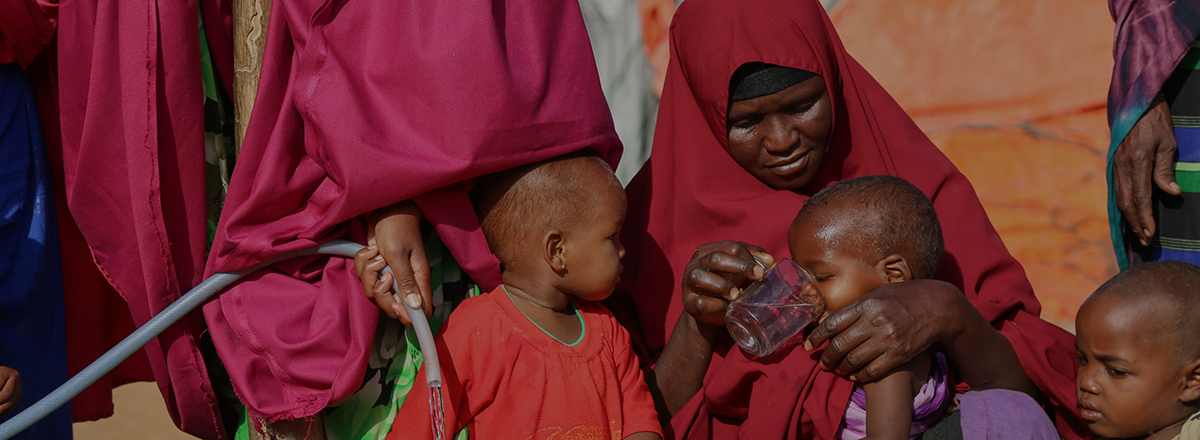

Media CenterCatholic Relief Services: Donors Shouldn’t Wait for Famine to Be Declared to Respond to Somalia’s Urgent Humanitarian Needs
FOR IMMEDIATE RELEASE
CONTACT:
Carlos Barrio
Catholic Relief Services
+34 644 154 497
[email protected]
Nikki Gamer
Catholic Relief Services
+1 978 884 0003
[email protected]
NAIROBI, KENYA December 13, 2022 – In response to the latest Integrated Food Security Phase Classification (IPC) report, Catholic Relief Services (CRS) is warning of worsening food insecurity in Somalia while urging donors to do more to prevent the crisis from escalating.
“What we’re seeing on the ground is beyond tragic,” said Rebecca Hallam, CRS’ country representative for Kenya and Somalia. “People are dying from starvation, many of whom are women and children.”
According to the latest report, which stops short of declaring famine, more than 5.6 million people are facing acute food insecurity, including more than 200,000 people facing catastrophic food shortages. Despite ongoing aid efforts, the report states that the underlying crisis has not improved, and that more “appalling” outcomes have only been temporarily averted.
“People still urgently need help, even though famine has not been declared,” Hallam said. “Families are being forced to make heart-breaking decisions: Do they buy cooking oil and feed their children, or do they buy the medicine they need to recover from illnesses? Because there’s not enough money to buy both. Out of desperation, millions of families are selling everything they own or are leaving their homes to search for food and water. The scarcity of resources and the rise in costs have led to heightened conflict and political instability.”
Somalia’s food insecurity crisis is being driven by a historic drought, the worst in decades, coupled with ongoing conflict and market volatility driven in part by the war in Ukraine. A record fifth rainy season means millions of livestock have died while crops have been devastated, with water in scarce supply. An estimated 1 million people have been displaced since last year, while reports of gender-based violence are on the rise.
“People are giving up in ways that they never have before. People used to be able to cope with a failed season or two, and manage the challenges associated with it. But now, with multiple seasons failing, those same people are thinking that it is over, like the rains will never come back,” said CRS’ Kev Esteban del Castillo, who manages CRS’ emergency response efforts in Mogadishu. “It's no longer the thought of, ‘We have to just get through this, and things will get better next season.’ Now it is, ‘There is nothing left here for us.’"
According to the report, if aid efforts are not ramped up quickly, more than half the country’s population could be in crisis by the spring and summer. What’s more, the report states that famine is projected to occur in parts of Somalia’s Bay Region during the same period, with more than 500,000 children projected to be severely malnourished.
“In many ways, it’s the perfect storm of disaster. Tensions run high. Mass displacement is growing. In the internal displacement camps, families are lured by the promise of food and water, yet find the camps overcrowded and poorly run,” Hallam said. “What’s worse, poor water management makes these camps prone to disease outbreaks like cholera.”
A famine declaration is rare. When determining whether there is evidence of famine, the international authorities, in concert with the local government, assess threshold requirements, like a certain number of people dying each day. During Somalia's 2011 food crisis, more than 100,000 people had died before the international community recognized it as famine. Historically, during a famine, death doesn't just come for those who are hungry or malnourished. Rather, it comes for anyone too old or weak to endure a complete breakdown of society- including from disease or exposure to the elements.
Somalia isn’t the only country in crisis. According to the latest United Nations humanitarian appeal, nearly 340 million people need humanitarian assistance across 69 countries, an increase of 65 million people (about twice the population of California) compared to the needs at the same time last year. The estimated cost of the humanitarian response for 2023 is about $52 billion, a 25% increase compared to the needs at the beginning of this year.
“The United States is the largest single donor of humanitarian aid to Somalia, representing more than half of all humanitarian funding in 2022,” said Bill O’Keefe, CRS’ Executive Vice President of Mission and Mobilization and Advocacy. “Nevertheless, the international community can – and must – do more in order to save lives across the region, beginning with Somalia.”
CRS first established an office in Somalia in the 1960s, before the outbreak of a civil war in 1994 forced the closure of the office in the capital. In 2011, CRS returned to the country to respond to the severe drought and famine. CRS implements multiple humanitarian programs in Somalia, including cash assistance, health and nutrition programming, and clean water programming. CRS also has a large presence in drought-stricken Ethiopia and Kenya.
“To avert the approaching worldwide hunger ‘tsunami’, donors need to provide more resources in the short-term while addressing the underlying drivers of food insecurity in the long-term, especially in the age of climate change,” O’Keefe said. “We have the resources and the knowledge to turn the situation around. It’s up to international donors to act before it’s too late.”
To read more about CRS’ work in Somalia, visit our crisis watch page.
###
Catholic Relief Services is the official international humanitarian agency of the Catholic community in the United States. The agency alleviates suffering and provides assistance to people in need in more than 100 countries, without regard to race, religion or nationality. CRS’ relief and development work is accomplished through programs of emergency response, HIV, health, agriculture, education, microfinance and peacebuilding. For more information, visit www.crs.org or www.crsespanol.org and follow Catholic Relief Services on social media in English at Facebook, Twitter, Instagram and YouTube; and in Spanish at: Facebook, Twitter and Instagram.
-----------------------------------------------------------------------------------------------------------------------------------------
Online Tools:
CRS Online Press Room: www.crs.org/press-room




